Norms-based investment strategies represent an enormous market opportunity for investors with $4,7 trillion in assets, according to the GSIA. This strategy is likely to benefit from regulatory tailwinds driven by initiatives such as the EU’s Sustainable Finance Action Plan, which incorporates normative criteria in its requirements.
Sustainalytics’ Global Standards Screening assesses companies’ impact on stakeholders and the extent to which a company causes, contributes or is linked to violations of international norms and standards. Our research provides assessments covering the UN’s Global Compact Principles, International Labour Organization’s (ILO) Conventions, OECD Guidelines for Multinational Enterprises and the UN Guiding Principles on Business and Human Rights (UNGPs). Beyond the market opportunity and compliance requirements, investors can leverage this strategy to proactively manage reputational risks.
Global Standards Engagement provides an active ownership overlay for clients who wish to align their stewardship activities to global standards.
Latest Insights
Regulating 'Forever' Chemicals: Examining Company Readiness and Investor Risk
EU's Iterative Approach to Sustainable Finance Regulations Isn't Perfect, But It's a Good Start
Global Standards Screening Introduction
Daily Screening
700,000+
News items
60,000
NGO and media sources
25,000+
Companies
Key Benefits
Improve Reputational Risk Management
Enhance your portfolio’s long-term performance by proactively identifying and managing business conduct related risks.
Ensure your Portfolio Complies with International Norms and Standards
Identify companies that violate the Global Compact’s internationally recognized principles for business conduct and align your portfolio holdings to these standards.
Respond to Responsible Investment Mandates
Expand your product suite to cover the fourth-largest responsible investment strategy and respond to relevant client mandates.
Gain an In-depth Understanding of Incidents
Access qualitative analyses of incidents that consider the company’s accountability, the severity of its impact and the quality of management’s response.
Report Insights
Company is classified as Compliant, Watchlist, or Non-compliant.
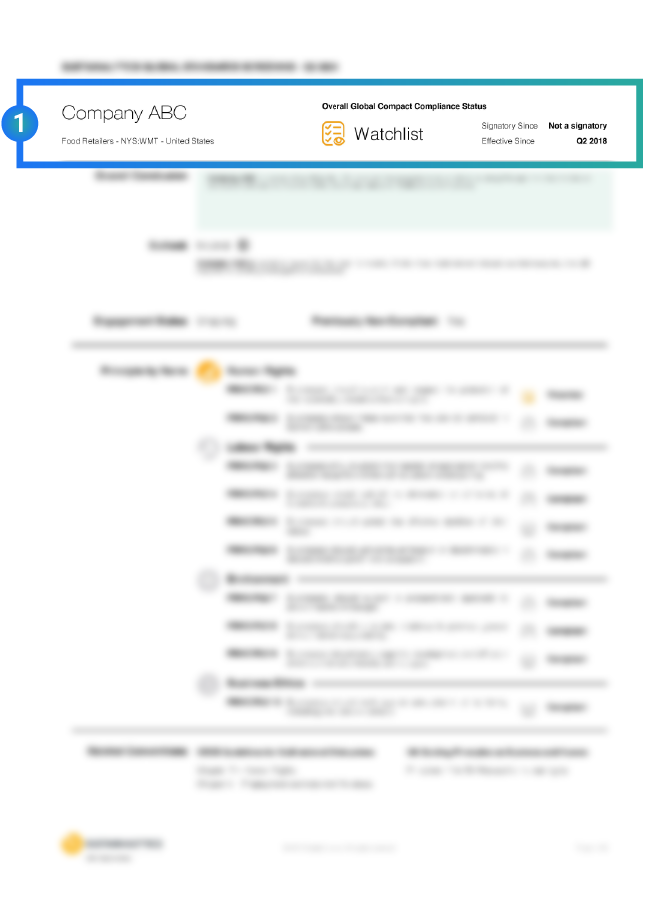
A Positive, Negative or Neutral outlook is provided based on our assessment of whether we expect an improvement or a deterioration in the assessment status.
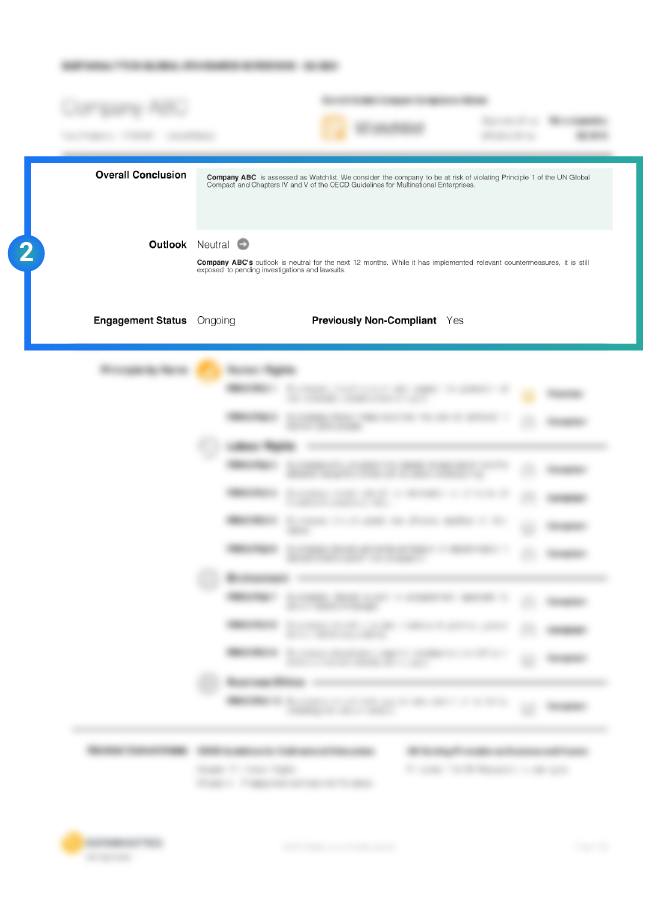
Detailed information about the Principle(s) violated, or at risk of being violated.
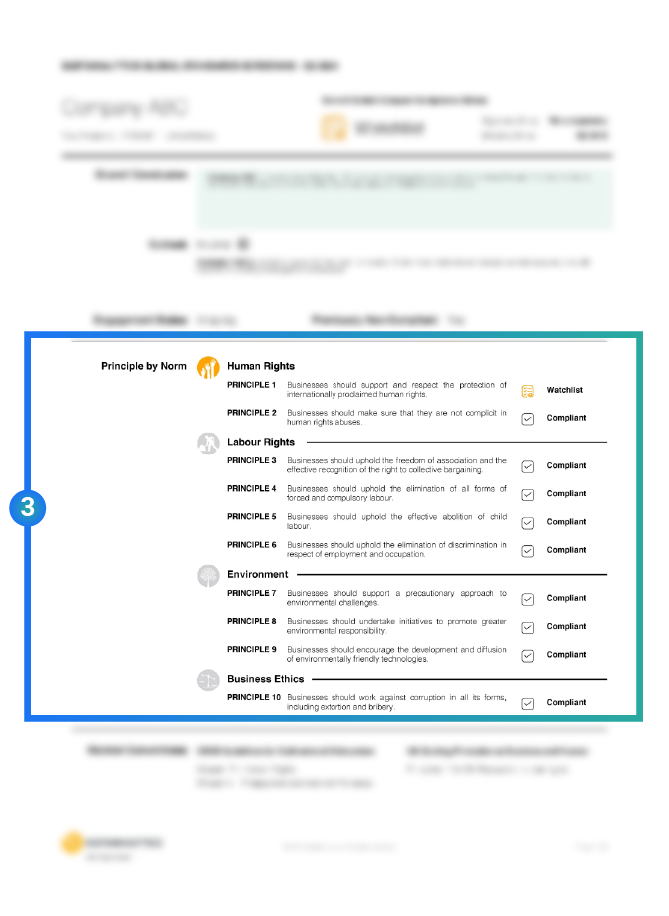
Company is analyzed and assessed according to the following framework: Severity of impact, company responsibility, and company management.
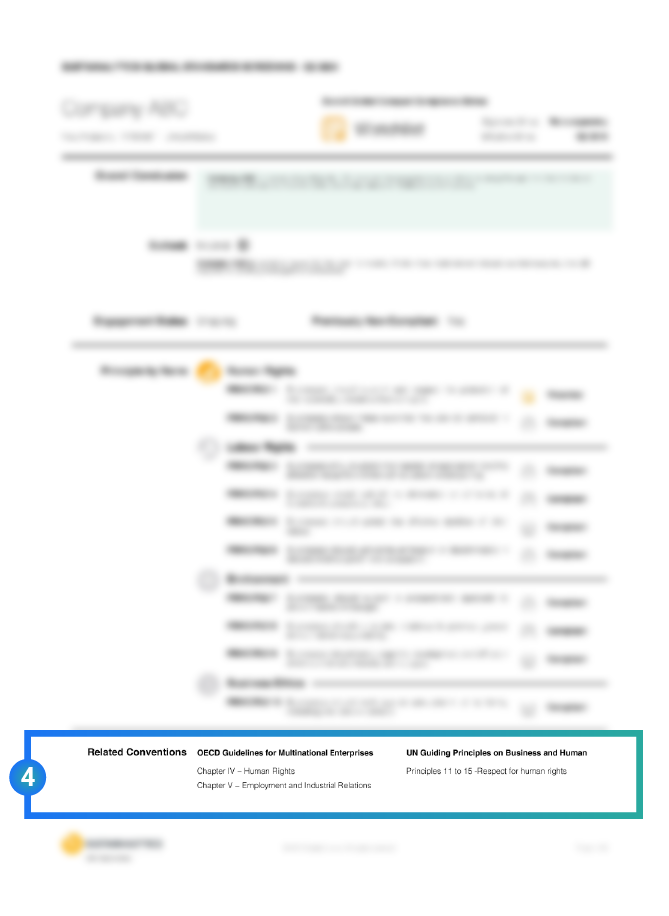
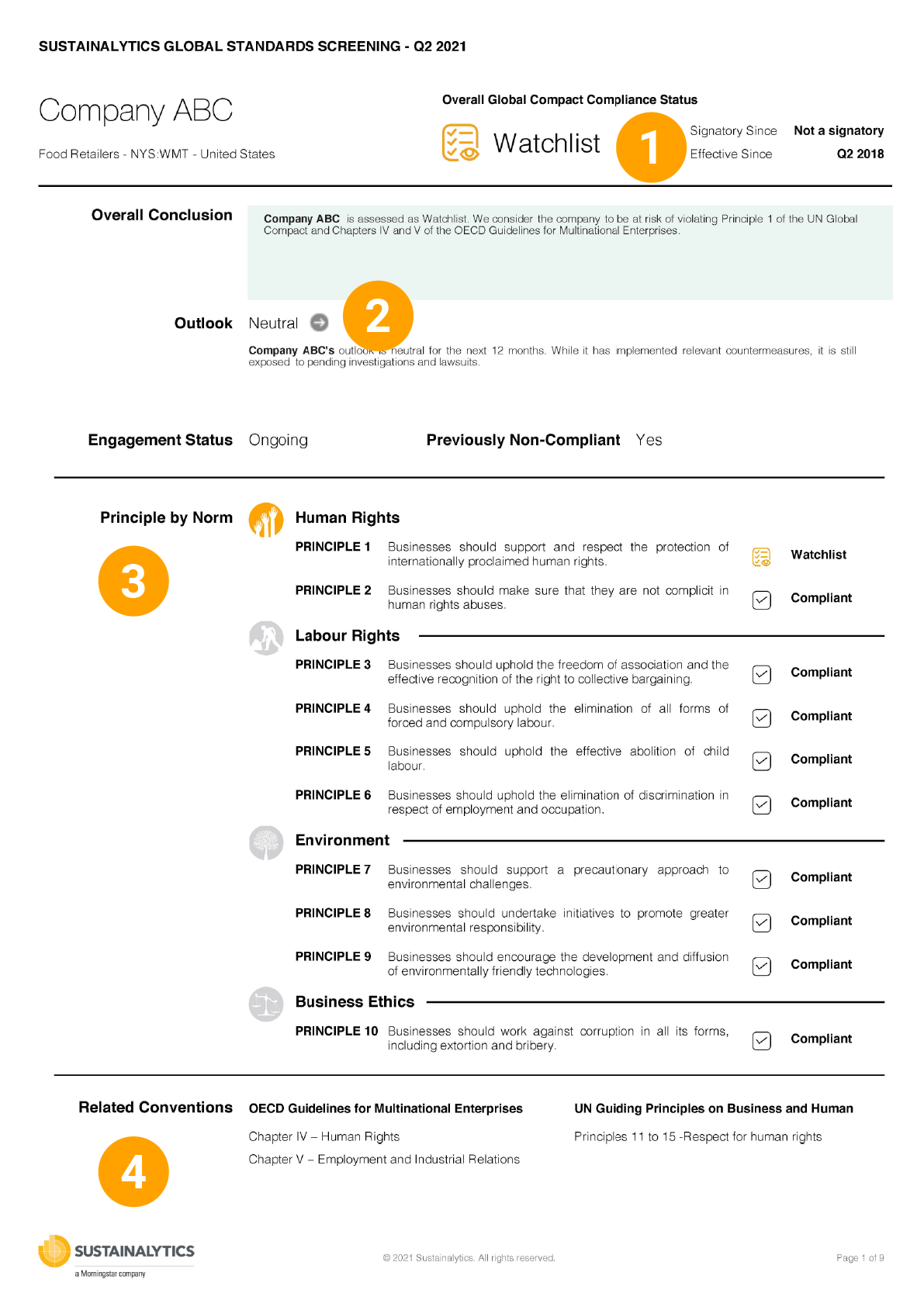




How it Works
1. We screen 700,000+ news items from 60,000 media and NGO sources daily to identify relevant news.
2. News items are assessed and classified by a dedicated incidents team.
3. Incidents are then analyzed on case and company-level and an assessment is made against the relevant Global Compact principle(s) with a forward-looking outlook.
4. An oversight committee consisting of senior representatives from Research, Product Management, Engagement Services and Quality Control reviews and approves all assessments.
5. Only after company contact regarding an allegation and an oversight committee’s evaluation a company is classified as Watchlist or Non-compliant.
6. Clients can access company profiles via the online platform in addition to receiving a quarterly update report.
Assessment Example
Example of Non-compliant assessment: Company ABC, a pharmaceutical company
Assessment:
In violation of UN Global Compact Principle 1 (Businesses should support and respect the protection of internationally proclaimed human rights)
Framework:
- Severity of Impact: Company ABC’s pricing model in the US has had a significant negative impact on patients through increased insurance premiums or reduced insurance coverage, depriving patients of much-needed treatments in the absence of viable alternatives
- Company Responsibility: The US authorities criticized company ABC’s business model as it was largely focused on making strategic acquisitions to establish price hikes for medication. This practice is exceptional compared to all its industry peers
- Company Management: Company ABC’s former CEO admitted that the company had been too aggressive in raising the prices of some of its drugs. On the other hand, the US authorities have accused the company of withholding documents requested, related to its pricing. This lack of transparency does not give us confidence in its ability to manage the risks associated with this issue
About Global Compact
The UN Global Compact is the world’s largest principles-based voluntary initiative consisting of over 16,000 companies from 166 countries. UN Global Compact signatories commit to universally-accepted principles on human rights, labor, environmental protection and anti-corruption.
Principle 1
Businesses should support and respect the protection of internationally proclaimed human rights; and
Principle 2
Make sure that they are not complicit in human rights abuses.
Principle 3
Businesses should uphold the freedom of association and the effective recognition of the right to collective bargaining;
Principle 4
The elimination of all forms of forced and compulsory labour;
Principle 5
The effective abolition of child labour; and
Principle 6
The elimination of discrimination in respect of employment and occupation.
Principle 7
Businesses should support a precautionary approach to environmental challenges;
Principle 8
Undertake initiatives to promote greater environmental responsibility; and
Principle 9
Encourage the development and diffusion of environmentally friendly technologies.
Principle 10
Businesses should work against corruption in all its forms, including extortion and bribery.
Demonstrate your Commitment as a Responsible Owner
Subscribe to Sustainalytics’ Global Standards Engagement to pool resources and let us engage with companies on behalf of you and other investors. Support company engagement with independent, 3rd party normative assessments of business conduct incidents.
Delivery Options

Global Access
Access our research through our user-friendly investor interface with easy to use screening and reporting tools. You can also access onscreen & PDF reports

Data Services Regular data feed (SFTP/FTP) or API
Access our research through an internal or a third-party system of your choice: Bloomberg, Factset and Markit
Why Sustainalytics?
A Single Market Standard
Consistent approach to ESG assessments across the investment spectrum.
Award-Winning Research and Data
Firm recognized as Best ESG Research and Data Provider by Environmental Finance and Investment Week.
End-to-End ESG Solutions
ESG products and services that serve the entire investment value chain.
30 Years of ESG Expertise
800+ ESG research analysts across our global offices.
A Leading SPO Provider
As recognized by Environmental Finance and the Climate Bonds Initiative.

Global Standards Engagement
Engage with companies that breach international norms and standards as identified by our Global Standards Screening research.
Learn More
Controversial Product Involvement
Screen for companies involved in specific product areas, such as tobacco and military contracting.

Defense Research
Create a robust defense policy with our Controversial Weapons Radar and Arms Trade Research.
Learn MoreMorningstar® Global Market SustainabilitySM Index Family
Best-in-class equity index that features reduced ESG risk profile with low to moderate tracking error.
Morningstar® Minority Empowerment IndexSM
Companies that are committed to racial and ethnic diversity as demonstrated by relevant programs and policies related to diversity, community development etc.
Related Insights and Resources
Regulating 'Forever' Chemicals: Examining Company Readiness and Investor Risk
Chemical companies face growing pressure to phase out some of the most hazardous substances from their product portfolios. Learn how well companies manage related risks and what upcoming regulations could mean for them and their investors.
Inconsistent Definition of ‘Sustainable Investments’ Across EU Regulations Could Cause (Unintentional) Greenwashing
The absence of clear parameters to support the regulatory definition of sustainable investments has pushed market participants to make judgment calls leading to diverging investor approaches.
EU's Iterative Approach to Sustainable Finance Regulations Isn't Perfect, But It's a Good Start
The EU Action Plan for Sustainable Finance has kept the European investment market busy over the past year. In this blog post, we highlight the merits that we see in the EU regulatory package. While not perfect, the regulation is a good start.
Post-COP15 Outlook: Evolving Investor Responsibilities in Biodiversity
Awaiting COP15’s Global Biodiversity Framework negotiation outcomes, financial market participants could face new regulatory pressure sooner than expected to integrate biodiversity assessment into their investment, decision-making processes.




